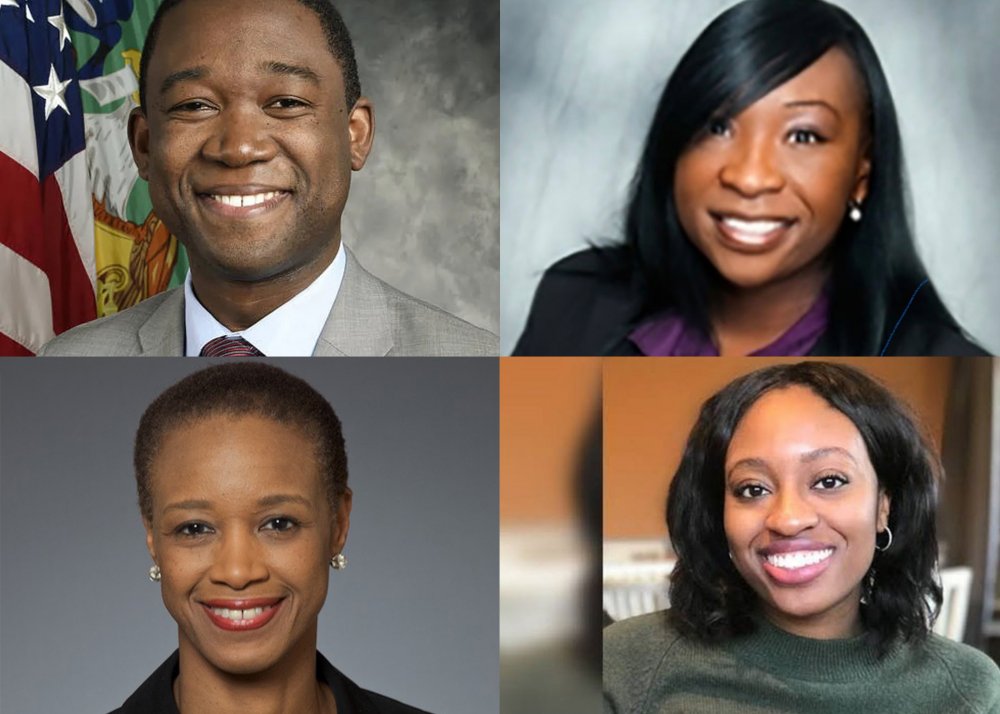By Eric Elezuo
President of the United States of America, Joe Biden has been making a number of crucial appointments across races into his cabinet as the world’s biggest democracy rolls out the drums to run a fresh administration.
The 78 years old Democrat, a former senator and Vice President, has reportedly appointed over 100 people among whom are a handful of Nigerians ever since he defeated former President Donald Trump in a much contested November 3, 2020 General Election, and sealed in December 2020 by the electoral college.
The appointment of the Nigerian-born Americans, namely Adewale Adeyemo and Osaremen Okolo, Funmi Olorunnipa Badejo as deputy treasury secretary, COVID-19 advisor and associate counsel respectively, and just recently, Enoh Titilayo Ebong has sent a message of positivity, making the world believe that all hope is not lost about Nigeria.
OSAREMEN OKOLO

Osaremen Okolo, the daughter of Nigerian immigrant, was appointed on Thursday, December 31, as one of the members of the Biden-Harris COVID-19 response team. She was born by Nigerian parents and raised in Massachusetts. She graduated from Harvard College in May 2017. She concentrated primarily in the history of science (medicine and society focus) with an allied, joint concentration in African-American studies. She also obtained a secondary in Global Health and Health Policy.
According to The Street Journal, the Democrat served as a senior health policy adviser to U.S. Representative Jan Schakowsky of Illinois. While working for Schakowsky, she drafted, negotiated, and managed the Congresswoman’s legislation, oversight, and policy across comprehensive health care and public health agenda. Outside of all things health, Okolo spends time writing creatively, fanatically cheering on her Boston sports teams and loves Nigerian food.
ADEWALE “Wally” ADEYEMO

Adeyemo has served as the president of the Obama Foundation. He was born in Nigeria and raised in Southern California. Adeyemo received his undergraduate degree from the University of California at Berkeley and a Juris Doctor from Yale Law School. He joined the Obama Foundation in August 2019 as its first president. An ally of the US former president, Barrack Obama, Adeyemo was the deputy director of the National Economic Council (NEC), the assistant secretary for international markets and development at the treasury department.
Adeyemo is a former senior international economic adviser during the Obama administration, and ihas previously served as the first Deputy National Security Advisor for International Economics from 2015-2016, and Deputy Director of the National Economic Council.
The 39-year-old has also served as the deputy chief of staff of the treasury department in 2012 and chief of staff of the Consumer Financial Protection Bureau (FPB) for 16 months, starting in 2010. Adeyemo worked as an editor at the Hamilton Project.
He later worked as the chief negotiator for the Trans-Pacific Partnership and also served as the first chief of staff of the Consumer Financial Protection Bureau under Elizabeth Warren.
FUNMI OLORUNNIPA BADEJO

Badejo was appointed as one of Biden’s legal advisers at the White House. Funmi, who married another Nigerian Tunde Badejo, is from Kogi State, and she is an alumnus of Berkeley Law College in the United States. Like Okolo, she is the daughter of an immigrant who identified herself with Florida, Funmi was the general counsel of the House select subcommittee on the coronavirus crisis.
Badejo is saddled with the responsibility of advising the president, the executive office of the president, and the White House staff on legal issues pertaining the president and the White House.
Badejo served as ethics counsel in the same office toward the end of the Obama administration.
A Biden-Harris campaign statement described her as follows:
“Her prior government service includes serving as Counsel for policy to the Assistant Attorney-General in the Civil Division of the U.S. Department of Justice, Ethics Counsel at the White House Counsel’s Office and Attorney Advisor at the Administrative Conference of the United States during the Obama-Biden administration,” the statement read.
“Olorunnipa Badejo began her legal career as an associate with the law firm of Manatt, Phelps & Phillips, LLP and was Legal Counsel at Palantir Technologies Inc. She is a graduate of the University of California, Berkeley, School of Law, Harvard University’s John F. Kennedy School of Government, and the University of Florida. Originally from Florida, Olorunnipa Badejo lives in Washington D.C. with her husband and son.”
ENOH TITILAYO EBONG

Biden also appointed Nigerian-born Enoh Titilayo Ebong as the acting director of the US Trade and Development Agency (USTDA).
“The appointment meant a return to USTDA where from 2004 to 2019, Ms. Ebong had served in a variety of roles, most recently as the Agency’s General Counsel, and Deputy Director and Chief Operating Officer,” USTDA said in a statement.“As Acting Director, Ms. Ebong leads an agency that partners with the U.S. private sector to develop sustainable infrastructure and foster economic growth in emerging economies, while supporting U.S. jobs through the export of U.S. goods and services.”
Ebong had previously served as the head of strategic partnerships at the Milken Center for Advancing the American Dream.
She is expected to lead the agency in partnering with the country’s private sector in order to develop sustainable infrastructure and foster economic growth in emerging economies.
Accepting the appointment, Ebong noted that “It is an honor to return to USTDA.
“The opportunity to lead the Agency comes at a critical moment when the world is turning to the United States for leadership on clean energy and climate-smart infrastructure, as well as safe and secure ICT solutions.”
She also noted that the agency is one of the most effective, targeted and proven tools within the U.S. government.
“I’ve longed believed in USTDA’s mission and program, which are fully aligned with the President’s vision of strengthening the country’s economy and addressing climate as an essential component of American foreign policy and national security,” Ebong said.
Ebong grew up in Lagos, Nigeria. Her father, Ime James Ebong, was a Nigerian civil servant who served as permanent secretary.
She practiced law at the Boston office of Mintz, Levin, Cohn, Ferris and Popeo, P.C., representing public and private companies in public offerings, financing transactions, mergers and acquisitions, and corporate governance issues before joining the agency in 2004.
Ebong earned a Juris Doctor from the University of Michigan Law School, a Master of Arts in Communication from the Annenberg School for Communication at the University of Pennsylvania, and a Master of Arts in History, with Honors, from The University of Edinburgh, Scotland. She is a member of the Commonwealth of Massachusetts Bar.

 News6 years ago
News6 years ago
 Featured6 years ago
Featured6 years ago
 Boss Picks6 years ago
Boss Picks6 years ago
 Headline6 years ago
Headline6 years ago
 Headline6 years ago
Headline6 years ago
 Headline5 years ago
Headline5 years ago
 Headline6 years ago
Headline6 years ago
 Headline6 years ago
Headline6 years ago


















